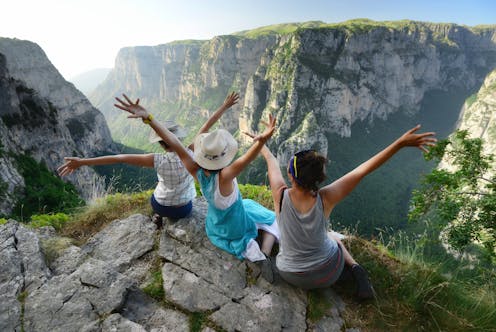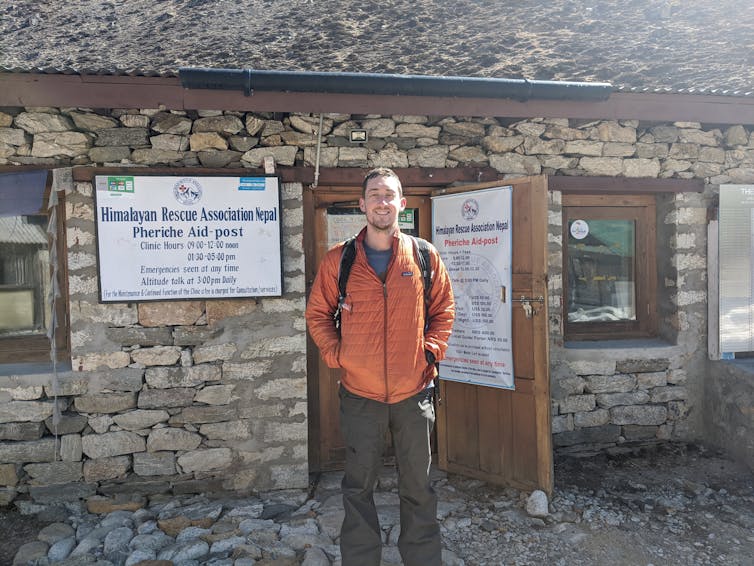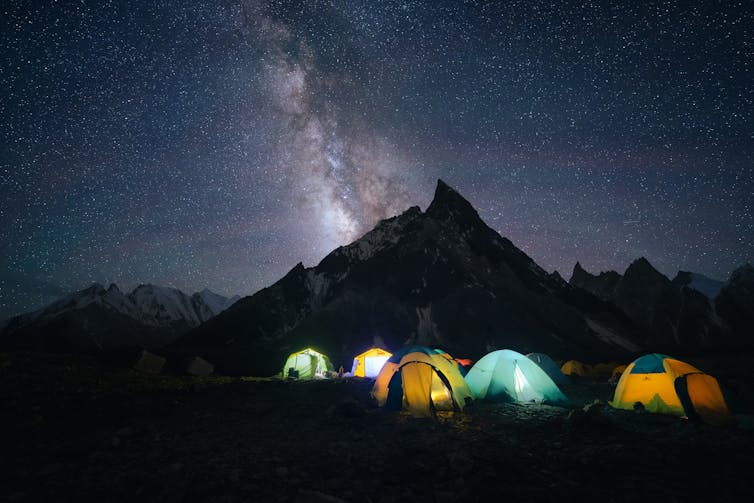
Equipped with the latest gear and a thirst for adventure, mountaineers embrace the perils that come with conquering the world’s highest peaks. Yet, even those who tread more cautiously at high altitude are not immune from the health hazards waiting in the thin air above.
Altitude sickness, which most commonly refers to acute mountain sickness, presents a significant challenge to those traveling to and adventuring in high-altitude destinations. Its symptoms can range from mildly annoying to incapacitating and, in some cases, may progress to more life-threatening illnesses.
While interest in high-altitude tourism is rapidly growing, general awareness and understanding about the hazards of visiting these locations remains low. The more travelers know, the better they can prepare for and enjoy their journey.
As an emergency physician specializing in high-altitude illnesses, I work to improve health care in remote and mountainous locations around the world. I’m invested in finding ways to allow people from all backgrounds to experience the magic of the mountains in an enjoyable and meaningful way.

Brian Strickland, CC BY-NC-ND
Table of Contents
The science behind altitude sickness
Altitude sickness is rare in locations lower than 8,200 feet (2,500 meters); however, it becomes very common when ascending above this elevation. In fact, it affects about 25% of visitors to the mountains of Colorado, where I conduct most of my research.
The risk rapidly increases with higher ascents. Above 9,800 feet (3,000 meters), up to 75% of travelers may develop symptoms. Symptoms of altitude sickness are usually mild and consist of headache, dizziness, nausea, fatigue and insomnia. They usually resolve after one to two days, as long as travelers stop their ascent, and the symptoms quickly resolve with descent.
When travelers do not properly acclimatize, they can be susceptible to life-threatening altitude illnesses, such as high-altitude pulmonary edema or high-altitude cerebral edema. These conditions are characterized by fluid accumulation within the tissues of the lungs and brain, respectively, and are the most severe forms of altitude sickness.
Altitude sickness symptoms are thought to be caused by increased pressure surrounding the brain, which results from the failure of the body to acclimatize to higher elevations.
As people enter into an environment with lower air pressure and, therefore, lower oxygen content, their breathing rate increases in order to compensate. This causes an increase in the amount of oxygen in the blood as well as decreased CO₂ levels, which then increases blood pH. As a result, the kidneys compensate by removing a chemical called bicarbonate from the blood into the urine. This process makes people urinate more and helps correct the acid and alkaline content of the blood to a more normal level.
The importance of gradual ascent
High-altitude medicine experts and other physicians have known for decades that taking time to slowly ascend is the best way to prevent the development of altitude sickness.
This strategy gives the body time to complete its natural physiologic responses to the changes in air pressure and oxygen content. In fact, spending just one night at a moderate elevation, such as Denver, Colorado, which is at 5,280 feet (1,600 meters), has been shown to significantly reduce the likelihood of developing symptoms.
People who skip this step and travel directly to high elevations are up to four times more likely to develop altitude sickness symptoms. When going to elevations greater than 11,000 feet, multiple days of acclimatization are necessary. Experts generally recommend ascending no more than 1,500 feet per day once the threshold of 8,200 feet of elevation has been crossed.
Workers at high altitude, such as porters in the Nepali Himalaya, are at particular risk of altitude-related illness. These workers often do not adhere to acclimatization recommendations in order to maximize earnings during tourist seasons; as a result, they are more likely to experience severe forms of altitude sickness.

Punnawit Suwuttananun/Moment via Getty Images
Effective medications
For more than 40 years, a medicine called acetazolamide has been used to prevent the development of altitude sickness and to treat its symptoms. Acetazolamide is commonly used as a diuretic and for the treatment of glaucoma, a condition that causes increased pressure within the eye.
If started two days prior to going up to a high elevation, acetazolamide can prevent symptoms of acute illness by speeding up the acclimatization process. Nonetheless, it does not negate the recommendations to ascend slowly, and it is routinely recommended only when people cannot slowly ascend or for people who have a history of severe altitude sickness symptoms even with slow ascent.
Other medications, including ibuprofen, have shown some effectiveness in treating acute mountain sickness, although not as well as acetazolamide.
A steroid medication called dexamethasone is effective in both treating and preventing symptoms, but it does not improve acclimatization. It is recommended only when acetazolamide is not effective or cannot be taken.
Additionally, it is important to avoid alcohol during the first few days at higher altitudes, as it impairs the body’s ability to acclimatize.
Unproven therapies and remedies are common
As high-altitude tourism becomes increasingly popular, multiple commercial products and remedies have emerged. Most of them are not effective or provide no evidence to suggest they work as advertised. Other options have mixed evidence, making them difficult to recommend.
Medications such as aspirin, inhaled steroids and sildenafil have been proposed as possible preventive agents for altitude sickness, but on the whole they have not been found to be effective.
Supplements and antioxidants have no proven benefit in preventing or treating altitude sickness symptoms. Both normal and high-altitude exercise are popular ways to prepare for high elevations, especially among athletes. However, beyond certain pre-acclimatization strategies, such as brief sojourns to high altitude, physical fitness and training is of little benefit.
Canned oxygen has also exploded in popularity with travelers. While continuously administered medical oxygen in a health care setting can alleviate altitude sickness symptoms, portable oxygen cans contain very little oxygen gas, casting doubt on their effectiveness.
Some high-altitude adventure travelers sleep in specialized tents that simulate increased elevation by lowering the quantity of available oxygen in ambient air. The lower oxygen levels within the tent are thought to accelerate the acclimatization process, but the tents aren’t able to decrease barometric pressure. This is an important part of the high-altitude environment that induces acclimatization. Without modifying ambient air pressure, these tents may take multiple weeks to be effective.
Natural medicines, such as gingko and coca leaves, are touted as natural altitude sickness treatments, but few studies have been done on them. The modest benefits and significant side effects of these options makes their use difficult to recommend.
Staying hydrated is very important at high altitudes due to fluid losses from increased urination, dry air and increased physical exertion. Dehydration symptoms can also mimic those of altitude sickness. But there is little evidence that consuming excessive amounts of water can prevent or treat altitude sickness.
The mountains have something for visitors of all interests and expertise and can offer truly life-changing experiences. While there are health risks associated with travel at higher elevations, these can be lessened by making basic preparations and taking time to slowly ascend.
![]()
Brian Strickland does not work for, consult, own shares in or receive funding from any company or organization that would benefit from this article, and has disclosed no relevant affiliations beyond their academic appointment.
























